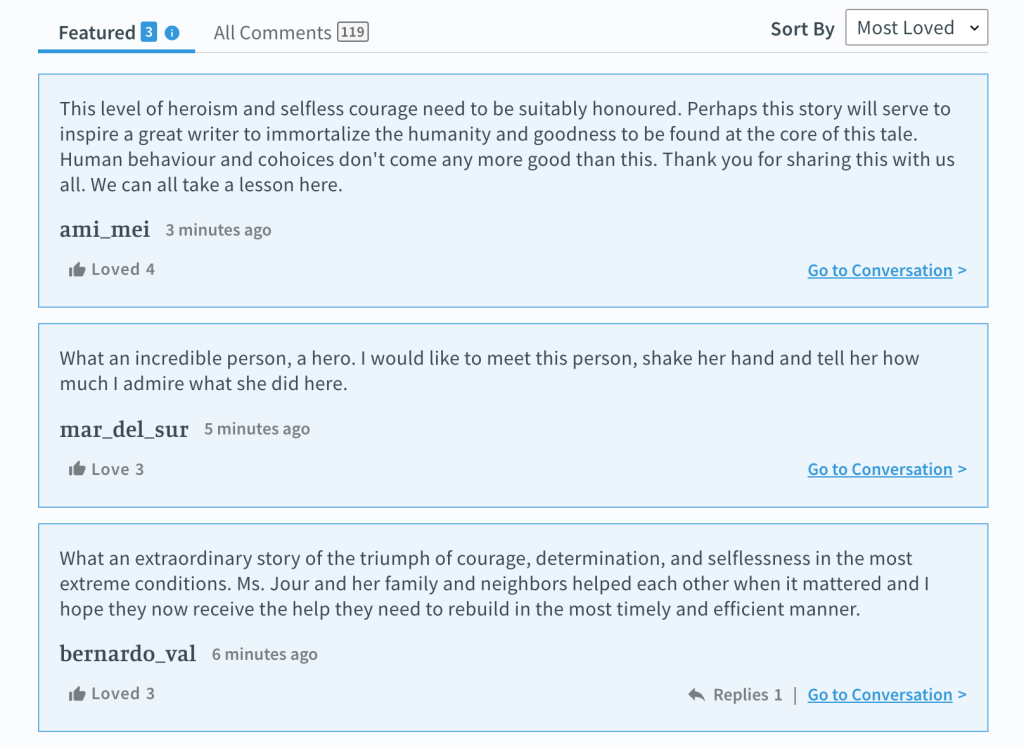💬 Coral
Enable comments on your own website with Coral (a F/OSS project maintained by Vox Media)

Coral (Code) is a web integration that you can use to enable commenting on your website. If you're building a blog, or a news website, or any other site that would benefit from interactivity – Coral is a great tool to use.

Basically, Coral lets you invite the horrors of internet comments to anywhere you like to host your websites – while also giving you moderation abilities and a great way to highlight insightful comments.
Coral is built by Vox Media (originally it was a multi-company effort, including the likes of Mozilla) and has been F/OSS for a very long time – amassing 1.9k ⭐s and lots of stargazers with a Apache v2 license.
🌠 Features
Coral helps manage comments on any website you run:
- Identify commenters with verified credentials (ex. Journalists)
- Mute user
- Manage (and uphold) user privacy
- Share discussions
- Sort discussions
- Per-article commenting settings
🤖 As described by AI
The Coral Project, initiated as a collaboration between Mozilla, The New York Times, and The Washington Post, and now operated by Vox Media, is designed to enhance community engagement for news publishers through open-source tools. Its primary goal is to bridge the gap between journalists and their audiences by fostering safer and more productive online dialogues. By offering robust commenting platforms and moderation tools, Coral enables publishers to manage and cultivate their online communities effectively. The project emphasizes increasing public trust in journalism, amplifying diverse voices, and creating more relevant and impactful reporting by engaging directly with readers.
Coral's suite of tools, such as the popular commenting platform Talk, allows users to identify journalists in discussions, mute disruptive voices, share conversations, and receive real-time notifications. It also supports moderators with AI-powered tools to filter out inappropriate content and highlight valuable contributions. Coral's commitment to privacy ensures no ads or trackers are present, making it a secure and transparent choice for publishers. By integrating seamlessly with existing systems and offering full customization through an open-source codebase, Coral helps publishers worldwide create vibrant and respectful online communities.
📺 Watch this
Unfortunately, there are a bunch of products named "Coral" (not to mention Coral reefs) so it's a bit hard to find content on Coral. Here's a decent guide on how to add Coral to a Webflow site:
👟 Getting started
First, you should probably take a look at the docs:

As listed there, to run Coral on your own website you'll need to set up a few things:
- MongoDB (persistence layer)
- Redis (cache)
- NodeJS (only if you want to build it yourself)
🐳 Get started with docker
Coral has an official DockerHub image which you can use – coralproject/talk
📦Click here to check it out on DockerHub
And if you'd like to run everything at once (all the dependencies) then you can use docker-compose:
version: "2"
services:
talk:
image: coralproject/talk:7
restart: always
ports:
- "127.0.0.1:5000:5000"
depends_on:
- mongo
- redis
environment:
- MONGODB_URI=mongodb://mongo:27017/coral
- REDIS_URI=redis://redis:6379
- SIGNING_SECRET=${SIGNING_SECRET}
mongo:
image: mongo:4.2
volumes:
- ./data/mongo:/data/db
redis:
image: redis:3.2
volumes:
- ./data/redis:/dataNote: on more recent versions of docker-compose you probably don't need the version: "2" bit
🧑💻 Want to contribute?
Coral is an open source project with tons of stars and tons of issues to check out if you'd like to contribute:
The ratio of open issues to closed is really spectacular, which means this is very likely a well-run project and a great one to get involved in.
Of course, simply using the product on your website and contributing back issues and discussing the project is also a great way to make help out open source projects.
📬 Want Awesome F/OSS in your inbox?
We'll send you new articles as soon as they go live.


